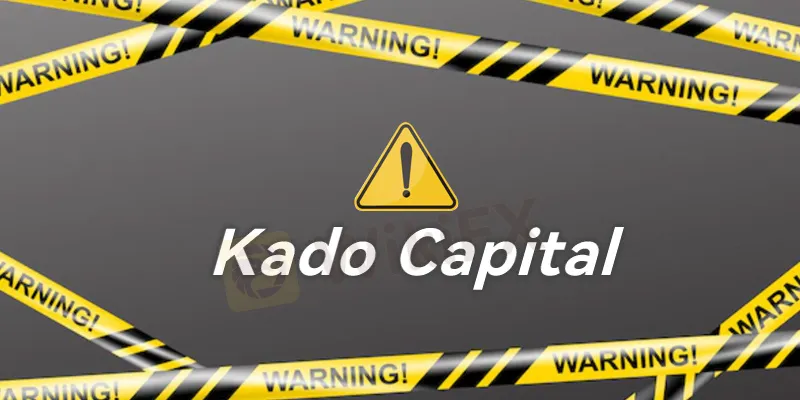简体中文
繁體中文
English
Pусский
日本語
ภาษาไทย
Tiếng Việt
Bahasa Indonesia
Español
हिन्दी
Filippiiniläinen
Français
Deutsch
Português
Türkçe
한국어
العربية
Warned by FCA: Unlicenced Broker Kado Capital is a Confirmed Scam
Abstract:Whether you trade stock, speculate over currency prices, or stake your interest in the crypto market, fraudsters never fail to find a way to loot investors.

Therefore, it is critical to stay vigilant and avoid signing up with scam brokers like Kado Capital.
Kado Capital - A Quick Overview
Kado Capital (www.kadocapital.com) is an online broker based in Dominica. The broker has been in the business since 2019. With only a custom-built trading platform available at clients' disposal, the company fails to offer flexible options to explore various financial markets, including forex, stocks, commodities, and cryptocurrencies. Other products and services include multiple account types and numerous payment methods.

Is Kado Capital.com Regulated?
No, Kado Capital is neither regulated nor registered anywhere in the world. Though the company claims to be a safe investment and brokerage firm, it hasn't shared any details about its licensing on its website.
Clients Feedback
Kado Capital holds the worst opinions among clients. Investors have rated it a scam broker based on its poor code of conduct. According to clients, the company manipulates pricing besides withholding funds without any reason. Customers have also accused the company of deliberately providing excessive leverage to wipe out clients' accounts faster.


What does Regulator say about Kado Capital?
Besides having no regulatory oversight, the adverse clientele feedback makes it to be in bad ordor. Since it doesn't even hold registration anywhere in the world, the company cannot be a legit entity. Further, it doesn't support third-party platforms bounding clients to use its proprietary trading app. Possibly, the company wants to control prices at its discretion.
Not to mention, the broker has also been warned by the Financial Conduct Authority (FCA). The regulator cautioned investors to avoid dealing with the company operating without authorization.

How do Scam Brokers Like Kado Capital Work?
One of the most common methods of scam brokers is to lure clients into false profit-making deals. Fraud intermediaries first allow clients to win some trades to give them a fake perception of the broker being legitimate and gain their confidence. After that, scammers persuade clients to add more funds to enjoy greater returns. However, after draining clients to their maximum limit, scam brokerages suspend investors' accounts, rendering their deposits inaccessible. Sometimes these companies choose to step down from the internet to stay undiscovered for a while or come back with a new identity. Kado Capital appears to be following the same strategy as its website isn't accessible anymore.
What To Do If I Already Have Deposited Funds With Kado Capital?
If you are one of those unfortunate clients who have deposited their money with the broker, it might be too late to act now. However, you can try initiating a withdrawal request, though unlikely to be successful.

Disclaimer:
The views in this article only represent the author's personal views, and do not constitute investment advice on this platform. This platform does not guarantee the accuracy, completeness and timeliness of the information in the article, and will not be liable for any loss caused by the use of or reliance on the information in the article.
Read more

The Daily Habits of a Profitable Trader
Every professional trader follows a structured approach to ensure they are well-prepared, disciplined, and able to seize opportunities with confidence. Whether you are a seasoned investor or an aspiring trader, adhering to a robust daily checklist can significantly enhance your performance. Use this checklist to check if you are a qualified trader

The Impact of Interest Rate Decisions on the Forex Market
Interest rate changes determine currency attractiveness, influencing capital flows and exchange rate trends. Understanding this mechanism helps investors navigate the forex market effectively.

How a Housewife Lost RM288,235 in a Facebook Investment Scam
A 47-year-old housewife in Malaysia recently fell victim to an online investment scam, losing a substantial sum of RM288,235 after engaging with a fraudulent scheme advertised on Facebook.

A Trader’s Worst Mistake: Overlooking Broker Reviews Could Cost You Everything
In today’s digital age, reviews influence nearly every decision we make. When purchasing a smartphone, television, or home appliance, we pore over customer feedback and expert opinions to ensure we’re making the right choice. So why is it that, when it comes to choosing an online broker where real money and financial security are at stake many traders neglect the crucial step of reading reviews?
WikiFX Broker
Latest News
The Withdrawal Trap: How Scam Brokers Lure Victims into Paying More
FCA to Investors: Think Twice Before Trusting These Brokers
Trump\s tariffs: How could they affect the UK and your money
Trump gambles it all on global tariffs he\s wanted for decades
TradingView Brings Live Market Charts to Telegram Users with New Mini App
Trump tariffs: How will India navigate a world on the brink of a trade war?
Interactive Brokers Launches Forecast Contracts in Canada for Market Predictions
Authorities Alert: MAS Impersonation Scam Hits Singapore
IG Group Acquires Freetrade for £160M to Expand UK Investment Market
U.S. March ISM Manufacturing PMI Released
Currency Calculator







